

Start a Superyachting Career
Start working on a superyacht by completing the following steps:.
- Have realistic expectations
- Select a superyacht job department
- Complete superyacht training courses
- Obtain an ENG1 medical certificate
- Select a location to join the industry
- Obtain visas & documentation
- Create a superyacht CV
- Find superyacht job vacancies
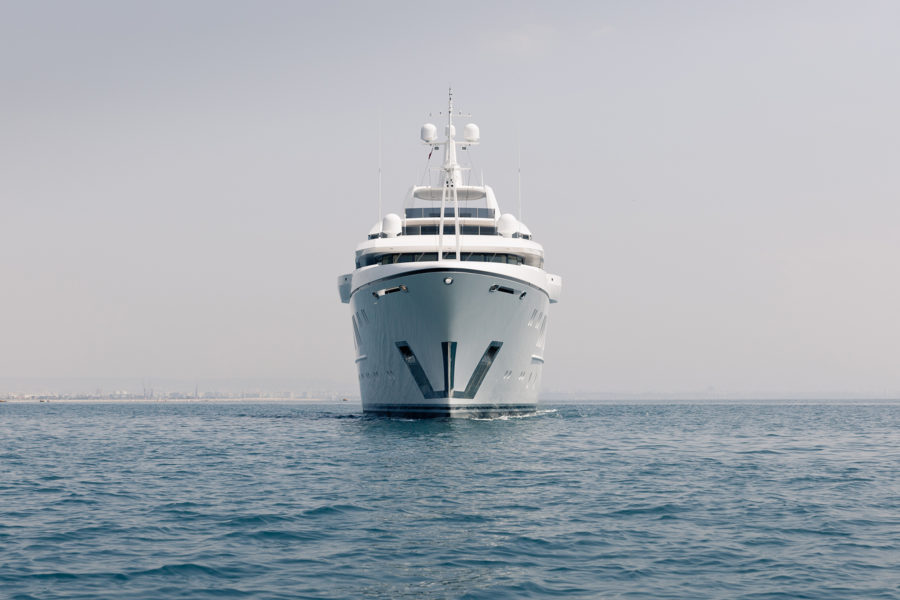
1. Have Realistic Expectations

- The superyacht industry is highly competitive and in order to qualify for employment a financial investment is required (training & travel)
- For applicants without relevant experience, being physically present at or near Superyachting hubs when searching for employment is important
- Obtaining the correct qualifications does not guarantee employment and training is not refunded
- Your passport and ability to obtain Visas have an impact on your employability
- Having contacts, experience, and the correct attitude is an advantage
- Working in the industry comes with some amazing benefits but like any career path, there are also disadvantages
- Being an extremely "hard worker" is not an advantage, it is expected
- The quality of work and attention to detail needs to be of a very high standard
- You need to be well-mannered, professional, and well-suited to living in close proximity to other crew
- Presentation matters
- Getting advice from multiple sources including crew who work in the industry is advised
- Different yachts, owners, crew, and itineraries = different experiences
2. Choose the Yacht Crew Department you Wish to Work in
Before joining the yachting industry, it is essential to decide on your career path. The work environment and duties associated with each superyacht department vary greatly. It is therefore advised that you understand the training, duties and requirements associated with each role. The most common roles for crew entering the industry are:

Steward / Stewardess
A superyacht stewardess is responsible for the guest service, housekeeping and laundry. In some cases, the position is combined with an additional role for those who come from a beauty or healthcare background.

Superyacht Deckhand
A deckhand is responsible for the cleanliness and upkeep of the yacht's exterior. Wash downs, line handling, tender driving, watersports and bridge lookout duties are common tasks for deck crew.

Superyacht Chef
Working as a superyacht chef comes with some unique challenges. Although the skills are certainly transferable, there is specific training and certification required. It can be a tough but extremely rewarding job.

Superyacht Engineer
Working on a yacht or superyacht as an engineer can be a rewarding career path. Although a background in engineering or mechanics is an advantage, it is not a prerequisite. The duties associated with the role are diverse, exciting and require a great deal of hard work.
3. Complete All Mandatory Superyacht Training Courses
Having the correct training and certifications is essential to your employability in the superyacht industry. In order to become a crew member, you will need to have completed the following training:
- STCW 2010 Basic training
- Proficiency in Designated Security Awareness or Proficiency in Designated Security Duties
- Department-specific training for your desired role. (I.e. stewardess, deckhand, engineer, chef, and officer courses)
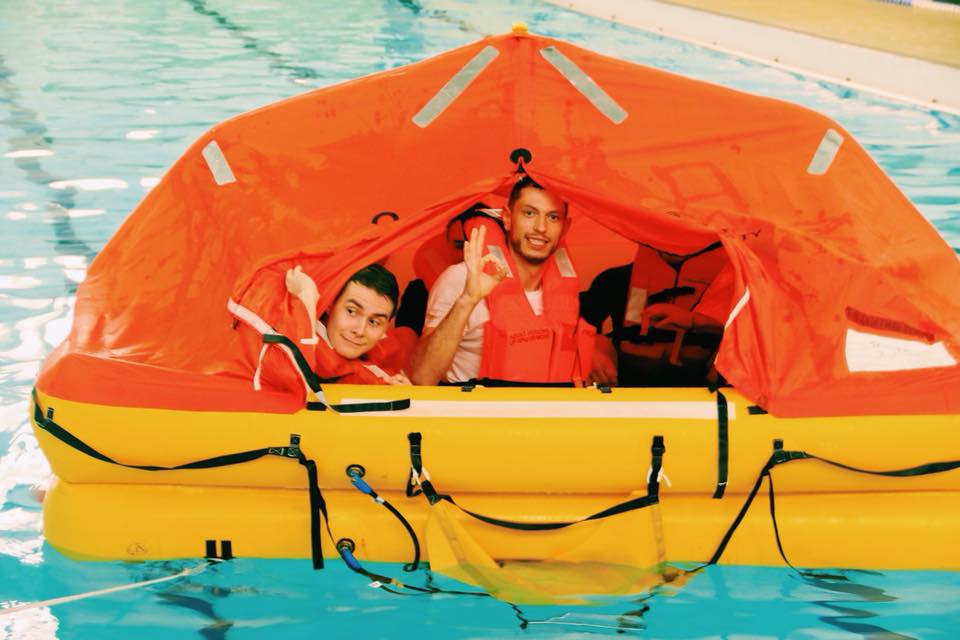
4. Obtain an ENG1 or ENG1 Equivalent Seafarer Medical Certificate

ENG1 Medical Certificate (or ENG1 Equivalent)
Superyacht work can be physically demanding. Ensuring that crew are physically well and able to work at sea is a crucial aspect of the crew and guest safety.
In order to work on a superyacht, you will have to hold an ENG1 Medical Certificate. Because the certification is set by the Maritime and Coastguard Agency (MCA), the examination must be performed by an MCA-approved doctor. The examination is done in order to identify any medical conditions that may prevent you from safely performing your work duties at sea.
5. Choose a Location to Join a Superyacht
When looking for your first job it is essential to be in the right place at the right time. There are a lot of factors to take into consideration when selecting your location, however the two most popular areas for working on a superyacht are:
6. Obtain the Correct Visas & Documentation for the Relevant Superyacht Hub
It is essential to obtain the correct visa for the country you plan to work in. It is important to understand the types of visas that exist as well as the local laws with regard to job seeking.

7. Create a Superyacht Crew CV
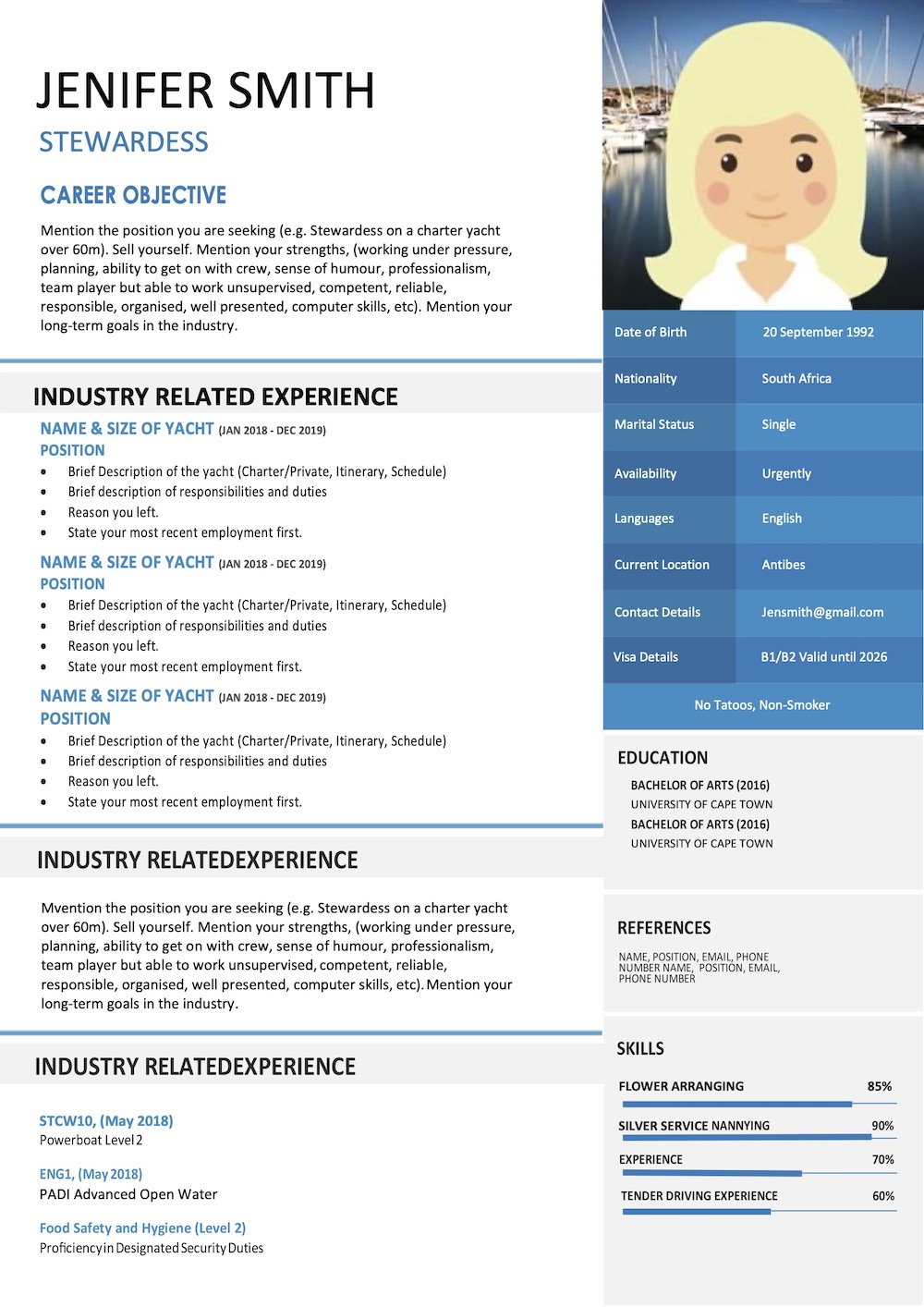
A professional and well-structured superyacht CV will help differentiate you from other job seekers looking to enter the industry.
Superyacht crew resumes have a different structure to normal CVs. If your CV is not laid out appropriately, your chances of being considered for a position are slim.
Examples and more information on how to create a great CV can be found on the links below.
8. Find Superyacht Job Vacancies
Finding the right job in the superyacht industry takes time and commitment. Using credible resources is key:
- The My Crew Kit Superyacht Job Board - Crew Agencies - Social Media Pages - Dockwalking - Networking

My Crew Kit Job Board:
My Crew Kit has the fastest-growing job board in the industry. Find the latest jobs posted by crew agents, captains and crew around the world!
View the latest vacancies
Crew Agencies
Crew Agencies play an intermediary role between yachts and crew. There are numerous agencies scattered around the main yachting hubs. Registering is a simple process and can be done online, many agencies will then request a short interview in person.
Find out more about Crew Agencies

Social Media Pages:
Online job boards and social media pages are extremely useful ways to apply for jobs as well as to find day work. It is important to only apply to jobs if you meet the criteria (have the correct experience and qualifications).
Be wary of which jobs you apply to. We recommend you only apply for jobs from closed social media groups with active moderators. Fake job posts do occur at times. Make sure you do not meet with or send personal information to suspicious accounts.
Find Appropriate Social Media Pages
Dockwalking:
Dockwalking is the process whereby you walk the docks with the aim of getting day work or even landing a permanent job. It is a gruelling task as there are often long distances between docks and it requires hours on foot. It also involves a lot of rejection as many boats are fully crewed and not looking for employees.
Find out more about dock walking.
Networking:
Your introduction to the world of yachting. The industry is growing exponentially; every year more boats are built, and more crew join the industry. It remains however, a close-knit community that feels a lot smaller than it is. ‘Everybody knows everybody’ and finding a job through a friend or a friend of a friend is often the best way to go. Crew like to work with people they get along with. They are therefore much more likely to hire someone from their extended network of friends than to look elsewhere (provided experience and qualification requirements are met).
A Few Suggestions:
- Network at every opportunity you get.
- Socialise with people you meet at training courses.
- Attend dock parties and BBQs.
- Socialise with the people in your crew house and visit other crew houses.
- Join yacht groups on social media.
- Hang out in the ‘yachty’ bars and restaurants.
- The more people you know in the industry the better off you will be.
Username or Email Address *
Remember me Lost your password?
Username or Email
Get New Password

The global authority in superyachting
- NEWSLETTERS
- Yachts Home
- The Superyacht Directory
- Yacht Reports
- Brokerage News
- The largest yachts in the world
- The Register
- Yacht Advice
- Yacht Design
- 12m to 24m yachts
- Monaco Yacht Show
- Builder Directory
- Designer Directory
- Interior Design Directory
- Naval Architect Directory
- Yachts for sale home
- Motor yachts
- Sailing yachts
- Explorer yachts
- Classic yachts
- Sale Broker Directory
- Charter Home
- Yachts for Charter
- Charter Destinations
- Charter Broker Directory
- Destinations Home
- Mediterranean
- South Pacific
- Rest of the World
- Boat Life Home
- Owners' Experiences
- Interiors Suppliers
- Owners' Club
- Captains' Club
- BOAT Showcase
- Boat Presents
- Events Home
- World Superyacht Awards
- Superyacht Design Festival
- Design and Innovation Awards
- Young Designer of the Year Award
- Artistry and Craft Awards
- Explorer Yachts Summit
- Ocean Talks
- The Ocean Awards
- BOAT Connect
- Between the bays
- Golf Invitational
- Boat Pro Home
- Superyacht Insight
- Global Order Book
- Premium Content
- Product Features
- Testimonials
- Pricing Plan
- Tenders & Equipment
How to hire the perfect superyacht crew
Related articles.
Fed up with a revolving door of crew? BOAT shares the industry secrets for finding the right people for the right job...
"Think of how much effort you put into hiring a CEO to run your company. You’d do a pretty good job of finding out who the right person was, right?” asks Jenny Matthews, founder of yachting diversity taskforce She of the Sea, and holder of a Chief Mate 3000GT licence. “Hiring someone to look after your multi-million-pound yacht is the same – but for some reason, people don’t think about it in the same way.”
Whether that’s true or not, it’s certainly the case that many owners have their frustrations when it comes to staff. From all across the industry, there have been tales of questionable stewardess skills, overbearing captains, love triangles on board... the list goes on.
Fortunately, stories like this are the exception, rather than the rule. Many owners, in fact, find that their enthusiastic, hard-working and good-humoured crew makes a large part of their yachting experience. But of course, there is always the odd disappointment – a new recruit that mysteriously doesn’t seem to gel with the rest of the team or those who stay for just a season before moving on.
A well-balanced, happy crew on board, meanwhile, sets the tone for the whole yacht, and it pays to get it right financially, too. Aside from the comfort that comes with being around those who know you well, “about a third of the running cost of owning a yacht every year is avoidable damage”, states Matthews, so trusting your expensive pride and joy to those who know what they are doing can cut down on maintenance costs significantly.
The peace of mind from having a competent, slick crew shouldn’t be ignored, either. “All you have to do is read the accident reports and you’ll find that people drown, they get concussed, boats burn down,” notes Matthews. “Behind this glossy veneer, a yacht is an extremely hazardous environment.” Add to this the fact that each time you replace a crew member on board, you’ll spend around £4,000 on new uniforms, crew agency fees, training and more, and you will start to see why investing a little time and energy into getting it right the first time makes a lot of sense.
So without further ado then, here’s our 101 guide to hiring the right crew...
Should owners hire their own crew?
It’s fairly rare for owners to get directly involved in the recruitment process, with good reason. Roles on board are often highly specialised and need someone who knows the job intimately to act as a recruiter. If you’re a captain-turned-owner or have run your own vessel previously, you might want to try going it alone, but a better bet is to take a double-pronged approach using your captain and a large and well-established recruitment agency.
That doesn’t mean you can’t have a say throughout the process. “Think about what kind of experience you want on board,” advises Matthews. “Do you want family-style dining or silver service? Are you going to be at beach clubs 90 per cent of the time or going exploring? You need to really define what you want because that feeling when you’re on board is going to be incredibly important.”
If you’ve got a captain that’s been with you for some time, “they’re going to know you intimately – probably better than you think they do,” says Matthews, so take their guidance seriously.
How do I choose a crew agency?
Choosing the right crew agency is half the battle won, and you only have to look at the recent red tape brought about by the global Covid-19 pandemic to see how using one can pay off. “Last year, recruitment was impossible,” says Lucy Medd, fleet crew manager and partner at Burgess, who has worked in the field for more than 30 years. “Getting crew from A to B involved a huge amount of work for many people, involving travel agents, embassies…” The issues remain in play today, with many Australian and New Zealander crew members returning home and choosing to stay there, leaving a gap in the yachting workforce that no other nationality has moved in to fill. Others who were laid off last year when owners scaled back to a skeleton crew have “found new jobs onshore and haven’t returned”, says Medd, so it’s certainly a challenging landscape in which to find good people.
With so many agencies around, it can be tempting to send the same job out to 20 or more companies, in the belief that the more feelers you have out there, the better chance you have of finding true talent. It’s a mistake, says Matthews. “When you do that the quality is going to go right down. People are just going to start firing CVs at you because they know 20 other agents are going for that one commission.” Daniel Küpfer, operations director at Ocean Independence and a former captain, agrees. “It’s turned into a first-come, first-served industry, where it’s obviously imperative to defeat the competition,” he says about the speed in which some agencies send through candidates. “It’s not a good development.”
One-person operations or newer agencies, which can be competitive in offering lower fees, can also seem like a preferable option, but in most cases, a long-standing organisation with multiple offices around the world is the better bet. Often, they’ll have staff who’ll have worked in the industry over decades, and a big black book of contacts that means they’re able to dig deep when it comes to checking out references.
“If they are the dedicated crewing division of an established brokerage or yacht management company, this should guarantee a level of professionalism,” advises Louise Caïlbourdin of The Crew Network in Antibes, which has three global office managers with more than 60 years of maritime experience between them. “For a further guarantee, check that a crewing agency follows maritime industry standards, that it is currently MLC 2006-compliant and has been externally audited by a serious entity such as DNV-GL.”
“My top three are Quay Crew in Antibes and Poole, YPI, and Erica Lay from El Crew Co,” advises Matthews. “These guys value competency over any other factors, and they’re the straight shooters.”
Job postings often receive thousands of applications, and they can’t all be taken at face value. “Do people lie on their CVs? Absolutely!” she laughs. “I once interviewed someone who claimed to have worked with a former colleague of mine. I said I’d get in touch with them and the interviewee looked panicked and suddenly said ‘Oh you can’t… he’s dead!’ Of course, I knew perfectly well that wasn’t the case.”
How else can I find good crew?
You shouldn’t be sceptical of dockwalkers, especially if they’re very young “green” crew. “We’re finding many green crew are getting their first jobs this way,” says Caïlbourdin, and Matthews agrees. “I think people will keep doing it until it becomes illegal; it’s a great opportunity,” she says. “What has changed is that 25 years or so ago, it was basically just backpackers turning up to get some more money. Now people are well dressed and ready to hit the ground running.”
Social media too might be a mixed blessing in terms of the volume of applications, but crew know that “they can get a job through a social media network, through someone else working on that boat, before the job even gets advertised on the market”, says Küpfer. And as for LinkedIn and other platforms? “Why not?” he asks. “It’s quantity but that doesn’t mean it’s not quality. We also use a platform called Yotspot, which you shouldn’t ignore. Captains and crew members have direct access [to it], it’s easy to upload a vacancy and the fees are reasonable.”
What are some red flags when hiring crew?
While agencies should take on the initial admin of filtering through applications, checking references and running background checks on experience and qualifications, it’s not unreasonable for owners to want to get involved around the final interview stage. Aside from the obvious – turning up late, being sloppily dressed, rude or ill-prepared – there are plenty of potential warning signs when it comes to meeting candidates.
“If I ever interview a captain and he says he’s never had any crew issues, that’s absolutely not true,” says Medd. Bad-mouthing former superiors, yachts or owners is something that Caïlbourdin watches out for, while you should be wary of applicants that seem up for anything. “At the end of the interview, if someone says please put me forward if you have any other positions, that’s not really a good sign,” notes Esther Delamare, senior recruitment manager at Hill Robinson.
It can be hard to filter out candidates at entry-level with little experience, something that Matthews does via simple knowledge tests. “I ask them, ‘Can you do me a bowline?’ Or, ‘What are the ingredients for an old-fashioned?’” she says. “If they haven’t worked on yachts before I’d look at if they’ve had waiting jobs, shop jobs, jobs in pubs… things that are hard work where you’re on your feet all day,” adds Medd.
Basic levels of training might seem unimportant, but it’s useful to differentiate between those who have been inspired by Instagram and reality-TV shows like Below Deck, and those who are serious about a career – not least because these certificates show a significant financial commitment on their part.
Moving from yacht to yacht is more common today than 10 years ago, when a minimum three-year stint was normal, so multiple boats on a CV isn’t necessarily a bad sign. “I see CVs and I’m shocked – it’s very different to when I was working on yachts. But it’s just the way it is,” says Küpfer.
“The thoughts on longevity have changed a lot; people leave boats for very different reasons,” agrees Matthews. “Now a red flag is more likely to be someone who has stayed on a yacht for a number of years at the same level. If I see someone who’s been an entry-level deckhand for six years, I want to know why they haven’t progressed.”
A cursory look at any applicant’s social media accounts is also a wise check, and can help gauge maturity and whether they’re likely to be a good fit for the rest of the boat. Should owners these days accept that their crew are likely to post on social media about the yacht and the destinations that you travel to? “No – owner’s boat, owner’s rules,” says Matthews.
How long does it take to hire a crew?
It’s possible to put together a whole yacht crew from scratch in a very short amount of time, but it’s far from ideal. You might be lucky and find good people who have left yachts that have been sold, or the stars might align and their contracts happen to be coming to an end as the seasons change, but in general “very high-level crew often have very good jobs with proper notice periods in place”, says Matthews. “If you want to essentially poach them, you should be wary about the ethics of asking them to leave a post before they can – when I’ve been in that position, it’s made me uncomfortable; it’s not the best start to a new role.”
On the flipside, good crew know their worth, and aren’t likely to be on the market for long. “If you see someone who fits the culture, has the right qualifications and gave a good interview, make them an offer and make it good,” says Matthews. “They’re not going to be hanging around.”
Which crew members are hardest to hire?
“Really good chefs are always hard to come by,” says Medd. “They’re quite flighty by nature.” On charters, certainly, chefs can get a rough ride, and of course whether a chef is good or not can often come down to your own personal taste.
Engineers, too, are in short supply, but as a general rule of thumb they move around far less. “Engineers never leave – once they fall in love with a boat that’s it and they’re there forever,” laughs Medd. Female engineers and captains are also rarer, while the number of experienced female interior crew out there means that candidates can afford to be picky about the jobs they take. “Often it’s a case of, do they [crew] really want the job?” says Delamare, rather than the other way round.
Interior staff in particular often work for no more than a few years in the industry, but if you’re keen on a really long-term crew, looking at those who’ve previously worked on commercial boats can be productive. “Especially engineers or people who’ve worked in oil and gas – there are a lot of them coming into the industry,” says Delamare, “and unlike green 19-year-olds, they’ve got plenty of experience.”
When it comes to finding a charter captain, “charisma and a repeat client base” is the secret ingredient, according to Caïlbourdin.
How can I keep crew happy?
In a nutshell: pay them fairly, treat them with respect and offer them competitive leave and time off for training. In general, owners tend to place more emphasis on salary than perhaps they should. Of course, “money is still right up there”, says Medd, and “if someone’s been on your boat for three years and they’ve not got a pay rise, they’re going to be looking around”, observes Matthews. Experienced, motivated staff, however, are more likely to be impressed by a calm, supportive working environment and the opportunity to move up the career ladder than an extra £1,000. “Very high salaries can actually be counterproductive,” says Küpfer. “We had a boat recently where people were overpaid and it meant they were staying put on a yacht that they didn’t like, rather than moving on. It wasn’t the best atmosphere.”
Allowing staff a healthy amount of shore leave prevents burnout. “There’s only so much time people can spend on board before they actually have to leave,” notes Matthews, while time off for training is all too often neglected. “Every single good crew member I know has had to leave a vessel because they weren’t even allowed a week off to do a course to further their career.”
This is why, when hiring department heads, someone who can act as a mentor and encourage crew development is key – if talent don’t feel supported and can’t rise up through the ranks, they’ll often leave to pursue opportunities elsewhere.
Should I psychometrically test my crew?
It might sound sinister, but psychometric testing is becoming more and more common, “especially on the larger boats”, reveals Matthews. Many who’ve engaged with it seem to find it yields erratic results. “I tested one captain once, and I said, ‘I’m never doing this again,’” says Medd. “The results were absolutely crazy. I think there’s got to be a lot more input to get the right output.” Nevertheless, it’s likely something that will be relied on more heavily in years to come, as tests become more sophisticated.
What if a member of crew just isn’t working out?
Sometimes, no matter how much effort you put into finding the right person, things still don’t seem to click. “It’s very easy to just hoof someone off,” says Medd, “but you need to find out what the problems are and if you can train people up or improve the situation somehow.” On larger boats, even good captains and managers can be far removed from problems happening further down the chain. Replacing crew members is costly, and can often be avoided with the right approach. Nevertheless, sometimes things don’t work out for reasons beyond your control, “in which case, both parties just have to walk away”, says Medd.
“The crew atmosphere is contagious and bringing happy, fulfilled and passionate energy to everything from cocktail parties to beach barbecues is a surefire way to ensure that owners can experience their vessel at its full potential,” says Matthews. “At the end of the day, it’s people that can make or break the experience.”
More stories
Most popular, from our partners, sponsored listings.
9 superyacht crew members share what it's really like working for a billionaire on board
- Superyachts are luxurious, but working on them isn't.
- Insider polled superyacht crew members to find out what it's really like working for a billionaire on board.
- They said their days are spent fulfilling requests and keeping the yacht in top shape — but it really all depends on the superyacht owner.
- Visit Insider's homepage for more stories .

While working on a superyacht sounds glamorous, in reality it can be anything but.
Insider polled superyacht crew members to get an inside look at life on board. When asked what working for a millionaire or billionaire is really like, they agreed on a few things, like long hours.
Many superyacht crew members wake up before dawn to start their day, which typically involves a lot of cleaning and catering to the requests of owners and guests.
Read more: The super rich are hoarding cash — instead bartering yachts, $30 million mansions, and caviar to ride out the pandemic
But while some superyacht owners are demanding, others are less so — it really all depends on their personality. Some crew members said that owners and guests are more like regular people than you'd expect.
Here's what life on board looks like, according to nine superyacht crew members.
Note: Insider was able to verify each crew member's identity, but we refrained from publishing their full names to protect their privacy.
Working on a yacht can be lucrative.
Insider previously reported that deckhands earn an average of $3,083 to $3,574 a month, depending on the boat size. Captains reportedly get paid even more — they earn $7,750 to $19,961 a month on average.
Kate Lardy of the Sun Sentinel reported that a captain in Fort Lauderdale once spent a total of $14,255 on day workers, who are hired temporarily for onboard services, during a two-month period.
But it's also tiring and demanding.
One captain who works on a 120-foot boat alluded to tiring conditions. Working for a billionaire is "demanding," he said, with hours that begin very early — before 6 a.m. — and end very late.
Yacht crew members have to meet high expectations.
One electronic technical officer who works on a 223-foot yacht stressed the pressure of delivering top-notch service while remaining level-headed.
Working on a yacht involves "very, very long days with little rest and expectations to perform at the highest levels of service while not losing your cool under pressure," he said.
They have to work hard to keep yachts spotless.
Guests and owners can be messy and dirty — and it's up to the crew to make sure it doesn't look that way. A mate on a 92-foot yacht said he had to wake up before guests or other crew members to get the yacht's exterior ready for the day.
"They expect it to look like no one has touched it," he said. "So any rain or dew, water spots, bird crap, or salt spray has to be continuously cleaned, not to mention having to constantly wipe stainless [steel] and glass when guests move around the boat. They leave smudges and fingerprints everywhere.
"By the time I start at the top of the boat and move around drying the boat, washing windows, and prepping water toys, depending on where the guests are, it's time to clean behind them."
He said he then has to be available for whatever the day brings, whether guests want to take the tender out or play with water toys, the interior crew needs help with service, or any maintenance issues need to be addressed.
There's a lot of cleaning, smiling, and snacking.
Nic, a chief stewardess, shared her typical daily itinerary, which extends from 6 a.m. to 11 p.m., with a one-hour break for a power nap.
There's constant snacking, as she doesn't always have time to sit and eat, she said. She's also "always thinking and planning ahead for the next meal or excursion," like what guests "need to take with them and what they need upon return," she said.
"Always thinking of ways to make the day special and 'perfect' (as much as possible)," she said.
She added: "Cleaning, cleaning, cleaning, and lots of smiling. Behind the scenes, a lot of running around and working at high speed, throwing stuff into drawers and sorting it out later when you have time, laughing, and keeping crew spirits high. Never-ending laundry."
Work is easier when the owners are away, which is often.
Billionaire owners actually don't spend a lot of time on their multimillion-dollar yachts. Neither do the guests who charter them.
"Owners or guests are typically not on the boat all that much, so most of the time the crew has the boat to themselves," said Michael, a former yacht captain who worked on yachts ranging from 130 to 170 feet.
"Work is pretty easy and consists of general maintenance and keeping the boat in perfect/ready state for when the owner does show up. If you have a good crew it can be very enjoyable. If you do not, it can be very stressful and miserable."
Everything depends on the owner's personality.
Some crew members get lucky working for generous yacht owners, while others get treated like the help.
"It's hard work and long days when they are on board," said Martin, the captain of a 155-foot yacht. "It really depends on the owner. Some have treated me like family, and some have treated me like a servant."
But sometimes it's not the owner who's difficult.
A chef on a 150-foot motor yacht also said that working for a billionaire could be unpredictable, as every boat and owner is different.
But it's not the owner of the yacht who's always difficult to work for.
"Bear in mind that the captain is every bit as much your boss as the owner is, and sometimes the captain is a bigger pain in the ass than the billionaire owner," she said.
Yacht owners are just your everyday people on vacation — with more money.
According to Mark, the captain of a 114-foot yacht, billionaire owners are just like normal vacationers. Kind of.
"They're just people holidaying, but with more money and toys to fill their days," he said.
They can be more down-to-earth than expected, but their spontaneity can be frustrating.
"It's really nice to find out that some of the wealthiest people you'll work for are actually more down-to-earth and normal like any person you'd meet on the street," a stewardess on a 112-foot sailing yacht said. "The saying is 'money screams, wealth whispers.'"
She added: "A typical day involves turning heads, beds, and laundry for guests and crew, which can be a lot if you're a department of one. Food and beverage service three times a day. A lot of plans and schedules change on the fly depending on the owners and their wants and whims, which can be a bit frustrating."
- Main content
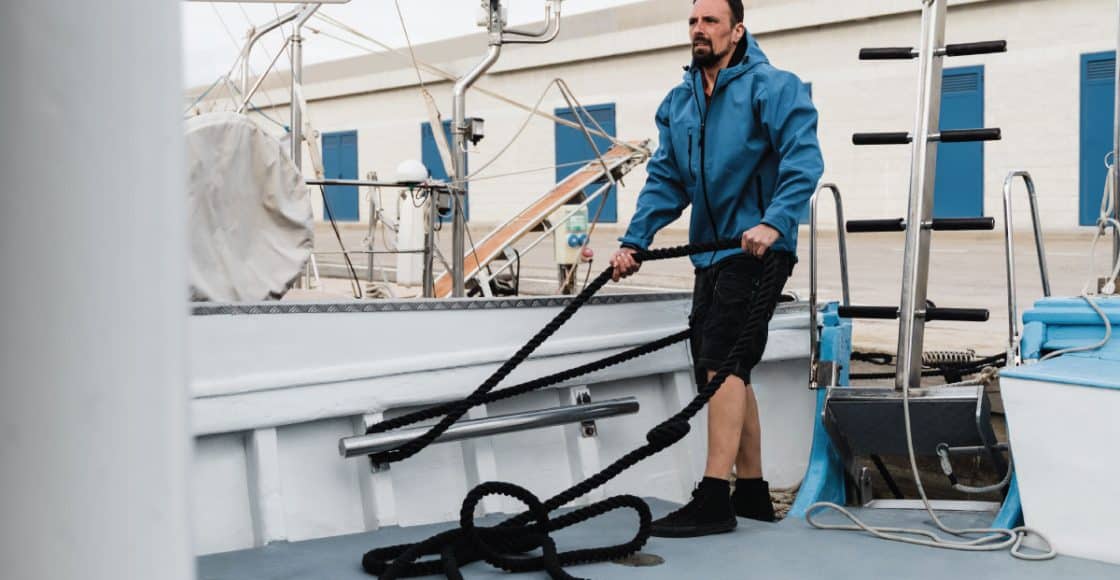
How to Work on a Yacht

Table of Contents
Last Updated on January 10, 2023 by Boatsetter Team
Working on a yacht is honest and good work; it also comes with many amazing perks:
- A one-of-a-kind workspace
- The ability to make industry connections
- Opportunities to move up
Ultimately, how to work on a yacht involves tremendous dedication, along with a little luck. We can set you on the right path here and now.
Browse for yachts for rent on Boatsetter

1. Do your homework
Just as you had required reading while in school, work on a yacht requires understanding a lot of information about deck duties. A few books and websites can (pardon the pun) steer you in the right direction.
The Insiders’ Guide to Becoming a Yacht Stewardess and its companion website workonayacht.com are both by Julie Perry, a stewardess-turned-yacht-marketing consultant. Also check out crew -centric magazines like Dockwalk and newspapers like The Triton , along with their related websites.
2. Get your CV in order
A CV—curriculum vitae—is your resume and should summarize all relevant experience plus transferrable skills. Perry says if you grew up waterskiing or boating, be sure to mention how long you’ve been doing it. Transferrable skills, meanwhile, range from house painting to woodworking and even being a nanny to waiting tables.
Work on a yacht can and does involve maintenance skills and hospitality skills. “You really need to sell yourself on paper, or you won’t stand out,” she says!
3. Go where the yachts are
Fort Lauderdale is the Yachting Capital of the World due to the large yachts that frequent its waters and yachting businesses headquartered there. Fort Lauderdale is also the number-one location for proper training (more on that below) and housing while you job hunt.

4. Find a trainer
How to work on a yacht begins and ends with training. Everyone, whether you want to be a deckhand, a chef, or a steward/stewardess, needs STCW training at a minimum. STCW ( Standards of Training and Certification of Watchkeeping ) is internationally required for every seafarer, in fact.
Briefly, it certifies that you have a basic understanding of safety hazards at sea and can respond properly in emergencies. Bluewater and Savvy Maritime Academy are two well-respected training providers in Fort Lauderdale. Additionally, you need an ENG1 medical certificate, proving you’re fit to work at sea.
Obtain this before enrolling in training in case a medical condition could preclude you from working onboard . Find doctors who provide the exams and certificates on yachting-pages.com , a valuable resource for captains, crew, and the industry.
5. Go beyond the basics
“It’s going to make such a difference in your understanding of the industry and your confidence level,” Perry says, plus increase your chances of landing a job. She adds that most yachts and crew-placement agencies require a certificate of proficiency in security, for example.
If you want to be a deckhand, she continues, consider obtaining a tender-driving certificate. Stewards and stewardesses often enroll in wine and bartending courses, meanwhile.

6. Save money for costs
Perry strongly advises having $6,000 to $7,000 to cover at least two months’ worth of expenses in Fort Lauderdale. These include not just housing (which you can find on yachting-pages.com) but also training, transportation, and meals.
A five-day STCW basic course costs over $1,000, and an additional one-day proficiency in security course is $300.
7. Networking is key
Once you get your STCW, “it’s networking, networking, networking,” Perry says. Online bulletin boards like daywork123.com post new opportunities daily—which can go quickly, so check and register early. Another source, meridiango.com , lets you register, upload your CV, and record a video, then interview via their portal.
Training schools often lend a hand with job hunting, too. Old-fashioned dockwalking—literally walking the marinas—can land you a job as well, as can frequenting places where crewmembers hang out at night.
8. Know the rules
How work on a yacht involves adhering to strict rules about not just safety but also privacy. The larger the yacht, the more the owners and guests prioritize discretion. “If you think you’re going to be a social-media influencer while traveling around on a 200-footer in St. Tropez, forget about it,” Perry warns. Some yachts don’t permit posting pictures or details about the yacht and their movements on social media.
About Boatsetter
Boatsetter is a unique boat-sharing platform that gives everyone — whether you own a boat or you’re just renting — the chance to experience life on the water. You can list a boat , book a boat , or make money as a captain .
Put your boat to work— Start earning an avg. of $20K yearly with Boatsetter

A journalist with more than 30 years’ experience, Diane M. Byrne is the owner of MegayachtNews.com, a daily website educating American superyacht owners, buyers, and their circles of influence about the leading builders, designers, cruising destinations, and more. She founded the website in 2007 as the first, and still the only, American-focused online media outlet exclusively covering this market. It features all-original content, for real stories of real interest.
Diane is additionally one of the most-sought-after journalists for expert editorial coverage and commentary about not only superyachts, but also general boating and yachting. Her byline appears in Boatsetter.com, DiscoverBoating.com, and the magazines Luxury Guide, Ocean, Yachting, and Yachts International.
Additionally, Diane is the Chair of the U.S. Superyacht Association, having been on the Board of Directors since 2015. Outside of yachting, she’s a trustee of Sempre Avanti, a non-profit resource supporting Italian and Italian-American individuals, businesses, and organizations in the United States and Italy.

Browse by experience

Explore articles

Boat Taxes: Everything You Need to Know

The Insider's Guide to the 2017 Palm Beach Boat Show
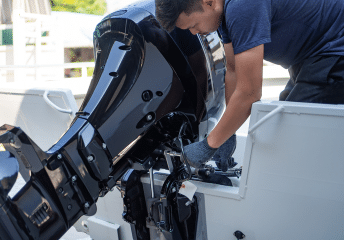
Boat Repair 101: How to Choose a Proper Boat Mechanic

Types of Jobs on Luxury Mega Yachts
If the thought of sailing to exotic locations onboard a luxurious yacht appeals to you, then you should look into working onboard a luxury yacht. Yachting crew work hard, but they find the work rewarding because they share a few common characteristics: they love yachting, the ocean, and working with people.
If these characteristics describe you, then you need to read more about how to get work on a megayacht.
These yachts can reach more than 80 feet in length, and cost more than $1 million U.S. dollars. Most of the yachts have three or more decks, a pool, Jacuzzi, helicopter pad, and the top of the line accommodations for guests. While crew living quarters can be much smaller, they are usually as comfortable and as welcoming as possible for loyal crew members. Some yachts are commercially owned and you'll work with a new group of passengers on each journey. Other yachts are privately owned, and you may work with the owner and his or her family on a regular basis.
There are many yacht crew jobs, from deckhands and stewards, to engineers and first mates. While you may need to work your way up to some of them, with some jobs you can complete a few months of training (or less), and be ready to apply.
When you become a member of CruiseJobFinder.com, you get all the info you need to learn about the opportunities in this exciting industry - what they are, what training you need, along with tips from successful crew members about how to get a job.
Don't miss out on the job you want! Join CruiseJobFinder
What Kinds of Yacht Crew Jobs Are There on a Private Yacht?
As you would expect, the number and types of crew onboard a yacht depend on the size of the yacht: the smaller the yacht, the fewer crew members there will be. That usually means that the crew members onboard smaller yachts usually perform more than one role. For example, the excursion tour leader may also double as a deckhand. Generally, there will be the main navigational crew members like:
- Mate (first, second, and third) Deckhand
You will also be able to apply for jobs on luxury yachts if you work in the engine department as:
- Chief Engineer
- Assistant Engineer
- Oiler/Wiper
These jobs mentioned above all require a certain maritime qualification and the person hiring you will normally ask you for your experience level.
The other yacht crew jobs will also require some education and/or experience and you will need to find a way to stand out in the crowd if you want to get the job. In these jobs, your primary goal is to meet your clients' needs:
- Cabin Crew and/or Housekeeping
- Massage Therapist
- Beauty Therapist or Spa Therapist
- Personal Yoga Instructor
- Hair Stylist
- Publicist and or Manager as well as Assistants
- Gourmet Chef and maybe one or two chef assistants
- Diving Instructor
- Pilot (Some large mega yachts have helipads)
Although the captain and most of the yacht crew are trained in first aid, certain high profile clients will also require the services of a doctor on board. This will normally be their personal doctor, unless he or she is not available.
Benefits of Working on a Privately Owned Yacht
Once you become a member of CruiseJobFinder , you'll find the complete range of jobs available on luxury yachts. You will be shown exactly how to apply, what qualifications and experience you need, and you'll get to choose where you want to work, whether it is in the Caribbean, Europe, or the Australian Coast. Not only will you get to travel all over the world making a living, but you will have the chance to meet some of the most influential and famous people across the globe.
This can be the start of a new career path, giving you the best kind of experience, or it could boost your current career to a whole new level. A luxury yacht is a brilliant place to work if you prefer a more personal interaction with your employers, and if you want to work with a smaller number of people. B The work can be hard, but the benefits of traveling, comfortable, free accommodations, and seeing the most beautiful places in the world make this a desirable profession for many people. What more are you waiting for? Become a member now to access the largest database of yacht crewing jobs, and learn exactly what you need to get the job you are interested in.
Tips for Living and Working on a Privately Owned Yacht
Actually, living and working in close proximity to wealthy, sometimes famous yacht owners can be a bit intimidating for some people. But your future in the industry depends on you always being friendly, professional, and courteous to owners and their guests - whoever they are. You can never go wrong by being professional and treating guests with respect - and that's exactly what passengers expect. When you cruise the ocean on a luxury yacht, you might be away from shore for a few days so you must come prepared with toiletries and essentials, as well as phone cards, passport and papers, and a small wardrobe for days off on land.
When you apply for luxury yacht jobs , you will also need to have a perfect resume, which you will learn how to create when you become a member.
You'll also learn correct yacht etiquette, hygiene and health requirements, safety guidance, and what kinds of marine terms and sea training you need to perform your job well and interact with all crew members effectively.
Your job onboard a privately owned luxury yacht could mean traveling to brilliant places and meeting interesting and important people like the Danish Royal Family, The Sheik of Dubai, and Paul Allen. We have a comprehensive list of small, medium, and large (super) yachts and their owners. You'll also find out where you can find the yachts - and jobs - all year round.
- Search Thousands of Jobs
- Cruise Industry Career Tips and Proven Strategies to Get Hired!
- Create a Personal Profile
- Use our Advanced Job Search
- Accounting - Finance (233)
- Activities - Fitness (51)
- Administration - Clerical (54)
- Administration - Management (8)
- Advertising - Marketing - PR (121)
- Casino (13)
- Cruise Line - General (651)
- Culinary - Chef - Cook (1,118)
- Deck & Engine (8)
- Engineering (397)
- Entertainment (22)
- Food & Beverage - Restaurant (536)
- Front Desk - Concierge (1)
- Guest Services (147)
- Housekeeping (29)
- HR - Payroll - Training (115)
- IT - Internet (20)
- Landscaping - Grounds (6)
- Mechanic - Maintenance (341)
- Other (243)
- Procurement - Purchasing (28)
- Resort - General (274)
- Retail - Merchandising (24)
- Sales - Reservations (34)
- Salon - Spa (257)
- Security - Surveillance (81)
- Shore Excursion (2)
- Travel - Tourism (23)

Looking For Work ?

- EXPLORE Random Article
How to Work on a Yacht
Last Updated: June 4, 2023 References
This article was co-authored by wikiHow Staff . Our trained team of editors and researchers validate articles for accuracy and comprehensiveness. wikiHow's Content Management Team carefully monitors the work from our editorial staff to ensure that each article is backed by trusted research and meets our high quality standards. There are 8 references cited in this article, which can be found at the bottom of the page. This article has been viewed 3,257 times.
Working on a yacht is a unique, fun, and potentially lucrative way to earn a living. While it can be intimidating and challenging to get a job on a yacht, having the opportunity to work while traveling can make it well worth it. To begin working on a yacht, you can get an entry-level job that requires little to no prior yachting experience. Once you are more experienced in the yacht business, you will be able to work on a yacht in a more advanced and specialized role.
Getting an Entry-Level Job on a Yacht

- Junior deckhands generally have a good work ethic, positive attitude, ability to learn on the job and follow directions, a professional appearance, and work well with a team. [2] X Research source
- Junior deckhands are responsible for cleaning, polishing, and waxing the yacht, assisting the bosun and first mate with maintenance, and helping with general yacht operations, including line handling, navigation, passenger safety, and water sports. [3] X Research source
- Junior deckhands make approximately $27,000 per year. [4] X Research source

- While not always a requirement, having a watersports certification, fishing knowledge or expertise, and/or carpentry skills can help you get a job as a deckhand on a yacht. Having one or more of these skills may also help you earn more money. [7] X Research source
- Much of a deckhand’s work is performed on the outside of the boat. Therefore, as a deckhand, you would be doing a lot of manual labor outside. This can be helpful to keep in mind when deciding if working as a deckhand is right for you.
- Deckhands usually make between $27,000 and $55,000 per year.

- Boat attendants are responsible for maintaining the cleanliness of the ship’s interior, helping with guest management and entertainment, and assisting the crew in maintaining the safety of everyone on board. [9] X Research source
- Successful boat attendants are high-energy and good entertainers, exhibit proper hospitality etiquette while on the job, and are committed to maintaining yacht cleanliness. [10] X Research source
- Entry-level ship attendants usually make around $40,000 per year, while more experienced workers can make up to $100,000 per year on a large luxury yacht. [11] X Research source

- One of the keys to working as a chef on board a yacht is the ability to get creative with your ingredients. Once you leave the dock, you will likely only have access to the ingredients that you have on hand.
- When considering working as a chef on a yacht, it can be helpful to take into consideration the size of the yacht, the number of people typically on board, and the conditions in the kitchen. As the chef, you will be responsible for making most (if not all) the food for everyone on board, meaning that you may be spending most of your time in the kitchen.
- If you have experience or professional training as a chef, you can make between $52,000 and $100,000 per year on a yacht, depending on your level of training and the size of the yacht. If you do not have any prior experience, you can make between $36,000 and $75,000 per year as a chef on a yacht. [12] X Research source

- Crewnetwork.com and luxyachts.com are both popular yacht crew online agencies.

- If you are working on a yacht abroad, you may need to acquire a work visa. Contact your yachting company or owner to see if this applies.
Working in an Advanced Position

- Bosuns often have a specific area of expertise that helps them land the job and makes them a more valuable member of the crew, such as advanced woodworking, varnishing, rigging, or watersport expertise.
- Bosuns generally make between $36,000 and $100,000 per year.

- On smaller yachts, there is usually just one mate, called the first mate. On larger yachts, however, there may also be a second mate and, possibly, even a third mate. The second and third mates also have extensive experience, yet generally a bit less than the first mate.
- In the event of an emergency, or if the captain needs to take a leave, the mate is responsible for taking over the captain’s duties. As a result, mates need to have any required licenses or certifications for their specific type of yacht.
- Mates on a yacht typically make at least $48,000 and up to $100,000 per year. [14] X Research source

- Yacht captains must have a high school diploma or GED.
- To be a yacht captain, you will need to take a captain’s license course and pass the licensing exam.
- The captain of a yacht typically makes a minimum of $65,000 per year. Captains can make well over $200,000 per year working on a larger yacht. [16] X Research source

- Most engineering positions are available on larger yachts called superyachts. While smaller yachts will hire a yachting engineer for maintenance, they do not usually have a permanent engineer that works on-board. [18] X Research source
Expert Q&A
- Larger luxury yachts may also hire beauticians, pursers, and/or managers to provide luxury services to their clientele. [19] X Research source Thanks Helpful 0 Not Helpful 0
- You can find job postings for positions on yachts on general job search engines, such as Indeed and ZipRecruiter, as well as specialized yachting job search engines, such as yotspot.com and yaCrew.com. Thanks Helpful 0 Not Helpful 0
- When looking for a job on a yacht, it can be helpful for you to already have completed your Standards of Training, Certification, and Watchkeeping (STCW) certification course. This certification is not always required to work on a yacht, but it can help make you a more desirable candidate. Thanks Helpful 0 Not Helpful 0
You Might Also Like

- ↑ https://www.luxyachts.com/crewpositions/jrdeckhand
- ↑ https://www.luxyachts.com/crewpositions/deckhand
- ↑ http://www.workonayacht.com/index.php/official-yacht-stewardess-job-descriptions-salaries/
- ↑ https://www.crewfinders.com/yachtcrewsalaries.shtml
- ↑ https://www.luxyachts.com/crewpositions/mate
- ↑ https://www.luxyachts.com/crewpositions/captain
- ↑ https://www.crewnetwork.com/Yachting-Jobs/engineer.aspx
- ↑ https://whereintheworldisnina.com/working-on-superyachts/
About this article

Did this article help you?

- About wikiHow
- Terms of Use
- Privacy Policy
- Do Not Sell or Share My Info
- Not Selling Info
A Beginner’s Guide to Chartering a Yacht
By Chrissie McClatchie

With the pandemic driving a boom in superyacht charters , more and more people are taking to the water for their first yachting experience. But while some superyachts can cost more than a million a week to charter, you don’t need to outlay seven figures for your own yachting vacation.
Wondering what else you need to know before stepping on board for the very first time? We’ve turned to experts in the yachting industry for their insider intel on how to charter a yacht like a pro—from how much it will run you, to where to go, and well beyond. Read on.
Do I need a charter broker, and how do I find one?
It’s a charter broker’s job to match you with the right yacht and crew—and then take the lead in planning the entire experience. Professional bodies such as MYBA The Worldwide Yachting Association act as a database of industry-recognized professionals. But the best source for finding a charter broker is often your own network. “Building up a relationship with a charter broker is very important,” says Jacqui Lockhart, a Monaco-based broker at Camper & Nicholsons International . “If possible, look for a recommendation from a friend.”
Once you’ve found the right broker, communication with them will be key. “Take the time to be as detailed with your preferences, such as dietary requirements, likes and dislikes, and preferred activities, as possible,” says London-based broker Charles Crane of Edmiston . “This will give us and the crew the best information to make the charter a success and tailored to perfection.”
How much should I be prepared to spend?
“The entry point is around $40,000 for a week on a yacht 82-feet upwards that can sleep six people," says Lockhart. What can take first time charterers by surprise is that this isn’t an all-inclusive figure. “The charter fee covers the hire, the crew, the insurance—everything that’s linked to the yacht,” Lockhart continues. Anything specifically for the client is extra—including food and beverages, fuel, and dockage. As a rule of thumb, budget for an extra 30 percent on top of the baseline charter figure for these extras, which goes into a fund known as the Advanced Provisioning Allowance (APA). At the end of the charter, it is also customary to tip the crew; between 10 and 20 percent of the charter fee is a guideline figure. There may also be Value Added Tax (VAT) to pay on the charter rate, depending on the country of embarkation.
At the smaller end of the charter fleet, more opportunity exists for single-cabin bookings rather than whole yacht charters. This year in the Caribbean , Sheila Ruffin of Soca Yacht Charters has launched a “Stranger on the Seas” package. Prices start at around $6,000 per person—all-inclusive—on catamarans between 48 and 60 feet. “This allows couples the opportunity to mix and mingle with other couples for an adventurous and social yacht charter on the Caribbean Sea,” says Ruffin.
What destinations are best suited to first-time charterers?
“For first-timers, I wouldn’t recommend a remote destination,” says Captain Kelly Gordon of Freddy , a 106-foot charter yacht based out of the Bahamas . “When it’s hard to get to, that eats up some of your valuable time and can also take some of the fun out of it.”
While yachts are heading towards unchartered waters such as Antarctica with increasing frequency, cruising grounds in the Mediterranean and the Caribbean are classic destinations for a reason. “For the first-time charterer in these locations, there will be more yacht options to choose from, proven cruising grounds with known and safe anchorages, well-connected and easy access hubs to ensure smooth passage to embark and disembark the vessel as well as the ability to source most provisions that guests may want,” says Crane.
The key ingredient? The crew.
Although much of the focus is on securing the right yacht, the secret to the success of a charter is its crew. “Put simply, the crew make the difference between a good charter yacht and a bad one,” says Crane. Today’s crew are increasingly versatile. “They may also be a diving or yoga instructor, personal trainer, fisherman, or sommelier,” he continues.
The crew also knows your cruising area better than anyone else. “Be sure to pick their brain on fun things to do. They often love the opportunity to come up with fun activities and games, whether for kids or adults,” says Lotte Barker-Hahlo, a London-based charter broker at Burgess .
The level of hospitality from crew on most yachts often convert first-time charters into repeat customers. “The attention to detail from the crew is unsurpassed by any other luxury holiday,” says Barker-Hahlo. “From the unpacking of your suitcase to being offered a drink before you’ve even realized you’re thirsty, it’s 24-hour care and service.”
Gordon says that much of the feedback she receives at the end of a first-time charter is why didn’t we do this earlier? “People are always surprised at how we take the time to get to know their needs before they have even arrived. We really do study those preference sheets!”
Think carefully about who else you want on board
Another important factor to a successful yacht vacation? Your fellow travelers. This is a specific type of vacation, which should narrow your list of invitees. “Strongly consider who you vacation with when chartering a yacht,” urges Ruffin. “Unlike other vacation options, yachts are very intimate and exclusive. Choose to share your water adventure with those you like and will enjoy on the water for a week or more.” Maybe, even for veteran yachties, that's the sagest advice of all.
- World of Warcraft
- Baldur's Gate
- League of Legends
- Counter-Strike
- Ethics Policy
- Ownership Policy
- Fact Checking Policy
- Corrections Policy
- Affiliate Policy

GTA Online: How to complete Superyacht Life Missions
Step into the world of luxury and conquer the seas with the Superyacht Life missions in Grand Theft Auto Online . In this high-stakes quest, you are assigned to go against a rival gang’s attempts to disrupt the balance through a series of less-than-legal activities.
From extraction of cargo to killing a few folks, a total of six adrenaline-pumping missions are part of this quest which can be played with up to four players. And with the Weekly GTA Online update, there’s an added incentive—you can now earn a lucrative bonus of $100,000 per mission until May 15, making the rewards as enticing as the thrill of the chase itself.
How to access the Superyacht Life missions in GTA Online
As the name suggests, to play these missions, you must first reach millionaire status by purchasing the Galaxy Superyacht . Once the luxurious boat has been purchased, meet with the captain at the yacht’s bridge to begin the available mission.

Alternatively, you can call the captain directly and request a job to initiate the quest. Both of these options are available as long as you haven’t completed the whole quest line before.
All Superyacht Life missions in GTA Online
Mission 1: overboard.
The first mission involves a group of thugs stealing the yacht’s jet skis and documents specifying that said yacht is a permanent resident of international waters.
Get on a jet ski and begin tracking down the thugs docked near the Vespucci Canals. Eliminate them and retrieve the docs. While doing this, you will also have a high Wanted level and run to save your life.
After dealing with the enemies, the captain will call again, alerting you that the thugs are part of a rival yacht club. You need to head over there and sink a total of 10 boats.

The last objective is to get rid of your high Wanted level , then the mission is completed.
Mission 2: Salvage
After the success of the first mission, Captain Brendan sends you to collect salvage from the sunken cargo ship near the yacht. To start the mission, speak with the captain and head over to the southern section of the boat. Dive into the water and follow the tracker as it leads you to the cargo.
While underwater, a distress call from Captain Brendan will let you know that he has been kidnapped. Worse, the cargo has been collected from the ship has been stolen. A new objective will pop up, asking you to save the man.
Proceed to the designated location on the map and discreetly eliminate all enemies. If you are detected, the kidnappers will execute the captain. Rescue the captain and rescue the goods to complete the mission.
Mission 3: All Hands
After the events of the second mission, an unknown party starts to set the Pacific Country Club members’ cars on fire, and it’s up to you to stop it. To extinguish the fire, the captain will direct you to steal an airplane called Tula .

Head over to the Los Santos International Airport and eliminate the 10 coast guards patrolling the entrance. Using stealth can make things easier because getting caught will net you a two-star Wanted level. Simply board the Tula after clearing the guards.
After boarding the airplane, you will see eight water gauges on their HUD that require filling. To do so, land the aircraft on the water and wait until all tanks are filled. Then, proceed to the Country Club’s garage to extinguish the fire. Upon arrival, Kkangpae (the man responsible) and his goons will open fire on the plane, adding another challenge for you to overcome.
Extinguish the fire to receive a call from the captain, who tells you about another garage where Kkangpae’s men have set six more cars on fire. Fly the plane over there and extinguish this fire as well. This time, there is no need to fight anyone: Simply return to the yacht with the Tula after saving the cars to mark the mission complete.
Mission 4: Icebreaker
Captain Brendan formulates a plan to take revenge on Kkangpae and his men. The captain directs you to infiltrate the rival gang’s warehouse near the Cyprus flats by destroying 10 AC units.
This is a straightforward mission where you must destroy all the AC units while surviving the attacks of Kkangpae’s goons. Next, the captain will direct you to steal Benson, a product ready to be sold by the gang, and then to sell it directly to the buyer yourself.
Mission 5: Bon Voyage
Bon Voyage is one of the most intense missions in the Superyacht life questline as it involves surviving three waves of Kkangpae’s men trying to hijack the Super Galaxy yacht in extremely unfavorable weather.
Due to the harsh weather, the yacht generators have malfunctioned, and the anti-aircraft systems have gone down with them. Using this as an advantage, enemies attack the yacht from sea and air alike. It’s up to you to stop them.
You will need heavy armor to withstand the three waves of enemy attacks. The yacht’s generators will reactivate after the first two, triggering the anti-aircraft system, which targets and destroys helicopters surrounding the yacht, making your life easier for the final showdown.
Mission 6: D-Day
Captain Brendan is fed up with Kkangpae and his gang, so he tasks you with eliminating the leader on his yacht. To avoid detection, he advises using a submarine to disarm the mines placed nearby.

Track the yacht and disarm any mines in the vicinity. Once the area is safe, board the ship and take care of Kkangpae and his crew. Expect the leader to flee via his helicopter onboard: Use the RPG to take it and finish GTA Online ‘s Superyacht Life quest in style.

- Brokerage New Construction How to Buy How to Sell
- Yacht Fleet Yacht Catalog Charter Marketing Destination Guides
- Financial Services Payroll & Accounting Payroll Service Process Logistical Support Admin Services Crew Admin
- Job Descriptions Crew FAQ
- About Sitemap
36M MAMMA MIA NOW AVAILABLE FOR CHARTER
Luxury Yacht Group is pleased to welcome Mamma Mia to our charter fleet. Available for charters in the Caribbean and Bahamas.
40M ALEGRE NOW AVAILABLE FOR CHARTER
Luxury Yacht Group is pleased to welcome 40m Alegre to our charter fleet. Available for charters this Winter in the Caribbean and Bahamas.
THE ULTIMATE YACHTING EXPERIENCE
Luxury Yacht Group has global resources to build, sell, charter and crew your yacht. Understanding that every happy yacht starts with a competent crew our resources focus on your crew and how they impact your yachting enjoyment.
CHARTER WITH LUXURY YACHT GROUP
Luxury Yacht Group represents the finest yachts for charter around the world.
WE SUPPORT YOUR YACHT
We operate some of the best run yachts and work hard to support them with sensible shore based solutions. From basic payroll services to full service regulatory compliance we have the expertise to be sure that your yacht operates effectively.
THE BEST CREW HAVE DISCOVERED LUXURY
Luxury Yacht Group operates the largest crew agency with agents on three continents providing almost 24/7 coverage. The best crew have discovered Luxury.

New Construction
There is nothing more exciting than building your new yacht. We follow every detail and deliver on those details.
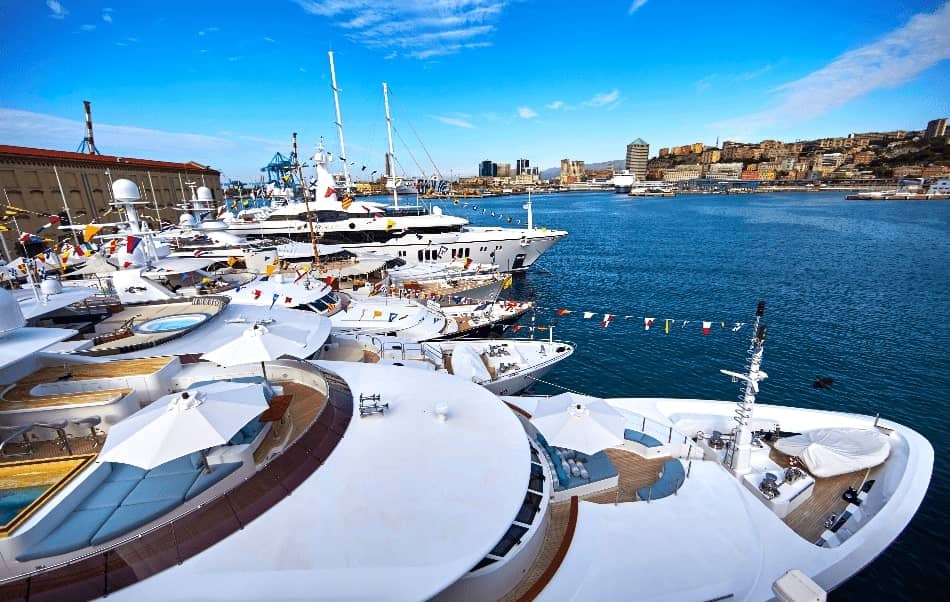
A simple guide on the process of buying a yacht.

How to Sell
A simple guide on how to sell your yacht.

Why Charter with Luxury Yacht Group?
We book the finest yachts around the world. Our charter brokers know the yachts and most importantly their crew. We go the extra mile to be sure that your vacation is truly memorable.

Our Charter Marketing Expertise
Our team of marketing professionals will generate the best possible net income for your yacht. We have experience marketing yachts priced from $40-$700,000 per week.
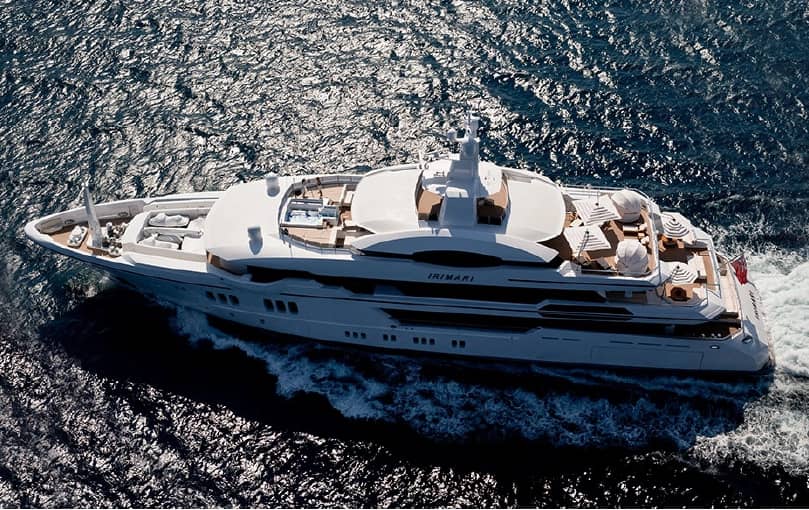
Featured Yachts
We can book all yachts worldwide but have curated a selection of our favorites here for you to review.

Featured Destinations
We have prepared itineraries for some of the finest charter destinations around the world.
Shore Support Services

Payroll & Accounting
We are experienced in accounting for yacht operations and crew payroll, providing streamlined, hassle-free payroll, contracts, and health insurance operation for yacht owners worldwide.

Support services have clear and simple pricing. Please review our offerings and their pricing here. We offer straightforward services and don't believe that you should have to enter into a big negotiation over the support service your yacht needs.

Document Library
Download library of very useful templates and forms published by Luxury Yacht Group. Go here for templated SEA's, terms and conditions, work lists and other useful "stuff".
Crew Placement

Crew Members
Luxury Yacht Group finds crew work onboard the finest yachts around the world. We place thousands of crew on yachts every year for full time, rotational, seasonal or day work positions.

The best crew have discovered Luxury! With over 140,000 crew registered and over 250,000 references verified Luxury Yacht Group is your “go to” resource for the finest crew to staff your yacht.
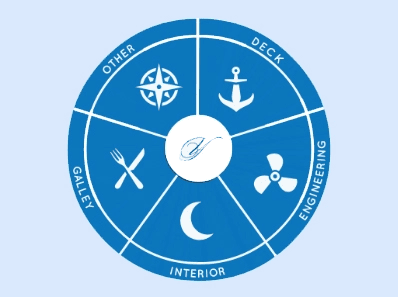
Crew Job Descriptions

PDF Summary Salary Guidelines

Why Use LYG for Crew Placement
Cost calculator.
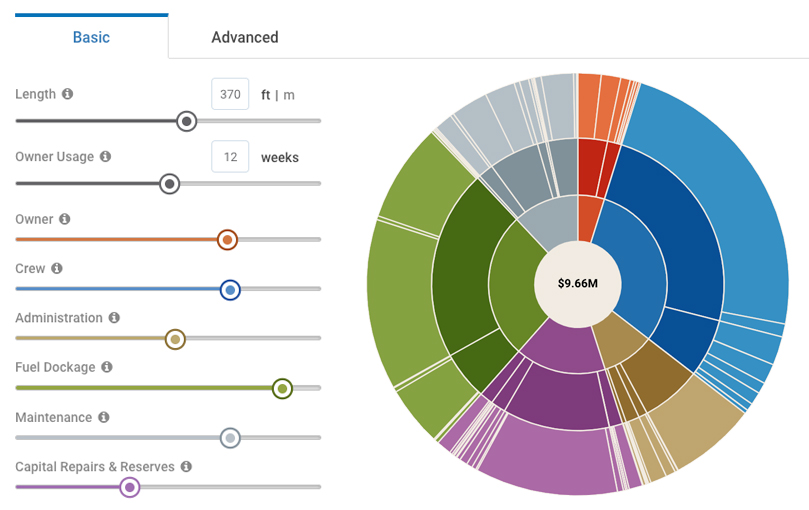
Industry leading operating cost calculator tool
Luxury Yacht Group has built a comprehensive and realistic operating cost calculator tool with over 100 fields in the chart of accounts. You can utilize this tool free of charge.

IMAGES
VIDEO
COMMENTS
The tips depend on the size of the Yacht and the guests, but a good estimate is 10 - 20% of the total weekly price of a Yacht. If you imagine a 50m (165 foot) Yacht with 9 crew, it typically charters for $150,000 - $250,000 per week. For simplicity, let's add a 15% tip for $200,000/wk.
Inexperienced yacht crew working as deckhands or stewardesses can earn between $2000-3000 a month. With more experience and higher positions, your salary can be between $3500-$6000 a month. On charter trips, guests typically tip 5% - 15% of the weekly charter fee, which is split between crew members.
Working on a Luxury Yacht Working as a crew member on a superyacht is undeniably one of the most rewarding yet demanding professions, calling for hard work, dedication, and professional training. The opportunities within the yachting industry are vast, and at Bluewater, we are committed to helping every crew member discover their ideal yacht ...
You cannot work on board a luxury yacht without getting your basic qualifications first. Bluewater offers a full range of crew training courses for those just starting in the industry:. STCW 95 Basic Training (Europe) 5 Day Course Powerboat Level II 2 Day Course; Interior Introduction 3 Day Course; AEC 1 5 Day Course
About the Yacht Positions. The diversity and opportunities to work aboard superyachts around the world are endless. The yachts range in size from 60ft to 600ft with crew of 1 - 100 crew members in four primary departments. Each department is responsible for a unique set of tasks aboard and is suited for individuals with specific skillsets and ...
Step 4 - Apply and interview Online opportunities. Of course, you will find a huge selection of luxury yacht crew positions advertised online. Make sure you register with a specialised super yacht recruitment job-board, such as Yacrew, and upload your Resume so that you can easily apply for all suitable positions advertised there.Captains who are looking for crew use these sites to view ...
Working on Yachts: Marketing Your Skills - It will be important to identify which type of yacht you wish to work for before developing your applicant presentation package. A charter boat company may seek people with completely different skillsets than the hiring manager for a 100-foot luxury yacht preparing for a round-the-world voyage.
2. Choose the Yacht Crew Department you Wish to Work in. Before joining the yachting industry, it is essential to decide on your career path. The work environment and duties associated with each superyacht department vary greatly. It is therefore advised that you understand the training, duties and requirements associated with each role.
Use one large recruitment agency with a wide-ranging network, not multiple smaller ones. All images courtesy of Adam Nickel. A well-balanced, happy crew on board, meanwhile, sets the tone for the whole yacht, and it pays to get it right financially, too. Aside from the comfort that comes with being around those who know you well, "about a ...
The money you make will also depend on the owner of the yacht and where they are based in the world, the itinerary of the yacht, and whether it's private or charter. On average, this is what you can expect to earn monthly doing various yacht crew jobs: Deckhand Jobs: $2700. Steward: $3000. Chef: $4000.
MikeDotta/Shutterstock. Superyachts are luxurious, but working on them isn't. Insider polled superyacht crew members to find out what it's really like working for a billionaire on board. They said ...
Boatsetter is a unique boat-sharing platform that gives everyone — whether you own a boat or you're just renting — the chance to experience life on the water. You can list a boat, book a boat, or make money as a captain. Put your boat to work— Start earning an avg. of $20K yearly with Boatsetter. Diane Byrne.
Luxury Yacht Group is regarded as the industry leader for the proper placement of crew and we receive job orders from employers on a daily basis. To get started in the yachting industry there are a couple of key steps. ... Crew on private yachts tend to work longer hours and have more extensive job descriptions with less time off. We suggest ...
Our crew database includes 5,133 Captains, 10,037 Deckhands, 2,947 Chief Engineers, 1,313 ETOs, 5,570 Chefs, 15,180 Stews, 1,469 Massage Therapists, etc. Here are some of the recently registered yacht crew members: Hundreds of live jobs on yachts and superyachts. Jobs for yacht crew in the Mediterranean, Caribbean, USA and other locations.
The work is extremely varied and an assortment of skills are necessary to be successful. This department is responsible for the following aspects of the yacht operation: The development path for an individual wishing to pursue a career on deck is very specific and requires achieving certain milestones. As an entry-level deckhand, focus should ...
Types of Jobs on Luxury Mega Yachts. If the thought of sailing to exotic locations onboard a luxurious yacht appeals to you, then you should look into working onboard a luxury yacht. Yachting crew work hard, but they find the work rewarding because they share a few common characteristics: they love yachting, the ocean, and working with people.
Working On Yachts. We nurture and guide crew members through their careers from deckhands to captains, laundry workers to chief stewardesses, then in turn, provide them with their junior crew. View Now. Learn more and sign up to our newsletter. Registering with us gives you more opportunities than any other crew agency of finding a job on the ...
Much of a deckhand's work is performed on the outside of the boat. Therefore, as a deckhand, you would be doing a lot of manual labor outside. This can be helpful to keep in mind when deciding if working as a deckhand is right for you. Deckhands usually make between $27,000 and $55,000 per year. 3.
It is advantageous to have experience as a maid in a reputable hotel or within any hospitality service. In order to apply as a cook, you must be an experienced and accomplished professional. Most yacht owners are billionaires and as such expect only the finest dinning experiences. If you aren't 5 star, you might as well forget about it.
To Work on a Yacht Without Experience - Make a Plan. Yachts do hire people with no experience in yachting. The entry-level positions which offer new crew the best opportunity to learn the "ropes" in yachting are: junior deckhand, stewardess, steward, or cook. The key to finding your first position onboard is preparation.
This year in the Caribbean, Sheila Ruffin of Soca Yacht Charters has launched a "Stranger on the Seas" package. Prices start at around $6,000 per person—all-inclusive—on catamarans between ...
An adventurous fusion of illicit activities and luxury. All Superyacht Life missions in GTA Online Mission 1: Overboard. The first mission involves a group of thugs stealing the yacht's jet skis ...
Experience in five-star establishments (i.e. Michelin star restaurant, fine hotel) Wine certification. Tender driving certification. Limited computer skills. Yacht Steward or Stewardess have 0 - 3 years experience and are responsible for interior cleaning and maintenance. They earn $30K-38K based on yacht size & experience.
Regardless of what happens with the synagogue property, Related has a full slate of projects lined up in Tampa, from the Riverwalk district on the west bank of the Hillsborough River to Rome Yard ...
Luxury Yacht Group finds crew work onboard the finest yachts around the world. We place thousands of crew on yachts every year for full time, rotational, seasonal or day work positions. Find Your Next Job Employers. The best crew have discovered Luxury! With over 140,000 crew registered and over 250,000 references verified Luxury Yacht Group is ...